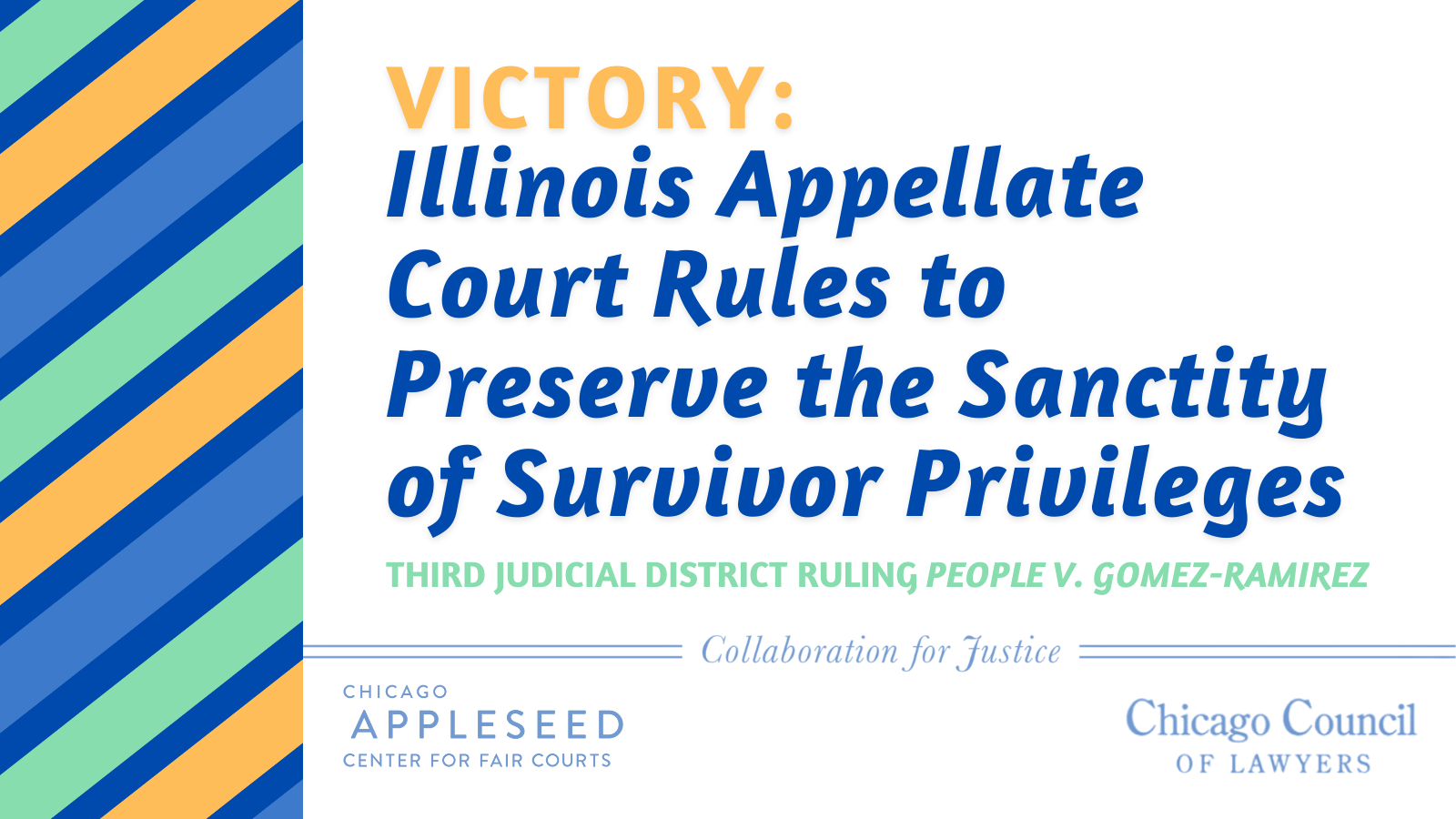VICTORY: Appellate Court Rules to Preserve the Sanctity of Survivor Privileges in Illinois
On Friday, July 10, Chicago Appleseed and Chicago Council of Lawyers submitted an amicus brief in the Illinois Appellate case of People v. Gomez-Ramirez (AMITA Health Adventist Medical Center, Bolingbrook, and Alexian Brothers-AHS Midwest Region Health Co., Contemnors-Appellants). Our pro bono partners at DLA Piper served as counsel for the amicus brief, filed in support of AMITA Health. Attorneys at the Illinois Coalition Against Sexual Assault, National Crime Victim Law Institute, and the Chicago Alliance Against Sexual Exploitation (CAASE) filed an additional brief in support of the appellants. The brief filed by Chicago Appleseed and Council of Lawyers focused on the issue of the State’s Attorneys’ improperly asserted right (under the defendant’s Sixth Amendment rights and the State’s duty to share exculpatory evidence in its possession) to search the health records of a victim on behalf of a defendant in a sexual assault case. The coalition of advocates on behalf of sexual assault survivors briefed on the issue of crime victim’s right to notice and an opportunity to be heard under the Constitution and the Rights of Crime Victims and Witnesses Act and the impact of the State’s attempt to obtain otherwise privileged documents.
The Illinois Appellate Court for the Third Judicial District has ruled in favor of AMITA Health, finding it properly discharged its responsibility to assert its patient’s physician-patient privilege and vacating the trial court’s contempt order. The court further ruled, as our amicus argued, that this privilege was not overcome by the defendant’s Sixth Amendment rights, as the documents were sought by the State and its duties under Brady v. Maryland and the discovery rules to produce exculpatory documents does not require it to obtain documents not in its possession or control. Finally, the Court ruled that the crime victim’s right to notice and an opportunity to be heard under the Constitution and the Rights of Crime Victims and Witnesses Act does not authorize the State to obtain otherwise privileged documents, as argued by the coalition of advocates on behalf of sexual assault victims. The Court did not reach additional Constitutional issues raised by that coalition of advocates.
Our congratulations go out to our colleagues and friends at DLA Piper and the Illinois Coalition Against Sexual Assault, National Crime Victim Law Institute, and the Chicago Alliance Against Sexual Exploitation (CAASE), who received thanks and acknowledgement from the Justices during oral argument for their contributions to the case. This case is a clear victory for the sanctity of privilege in Illinois.
In its ruling, the Court used language that hews closely to the argument in the amicus and which remains reasonably protective of defendants’ rights under the Sixth Amendment and Brady, while recognizing that in this case, the State sought to circumvent the privilege of third-parties to obtain records and information of which the defendant is already aware. With regard to arguments concerning the crime victim’s right to notice and be heard, the Court narrowly construed its ruling to whether notice of hearing alone was sufficient to overcome the physician-patient privilege under the statute, without going into the broader questions.
With regard to that issue, advocates on behalf of sexual assault victims worked this spring to amend the Illinois Rights of Crime Victims and Witnesses Act to clarify the prosecutor’s obligation to give a victim advance notice when the State wants to subpoena their confidential records. Public Law 102-0022, effective June 25, 2021, provides that a prosecuting attorney who seeks to subpoena information or records concerning the victim that are confidential or privileged by law must first request the written consent of the crime victim.
Again, we are grateful to our pro bono partners at DLA Piper who worked on this case on behalf of the Collaboration for Justice and our role in monitoring State’s Attorney’s Offices, reporting on the status of prosecution in Illinois and serving as community oversight to the role and impact of prosecution on justice in our communities. Special thanks to Joseph Roselius, Michael Geller, and Eleni Christou at DLA Piper for their excellent work on this amicus brief and to the Monahan Law Group for bringing the matter to our attention.

